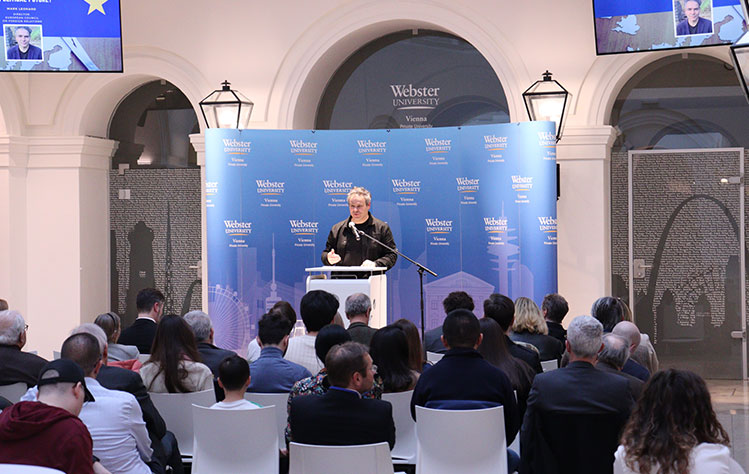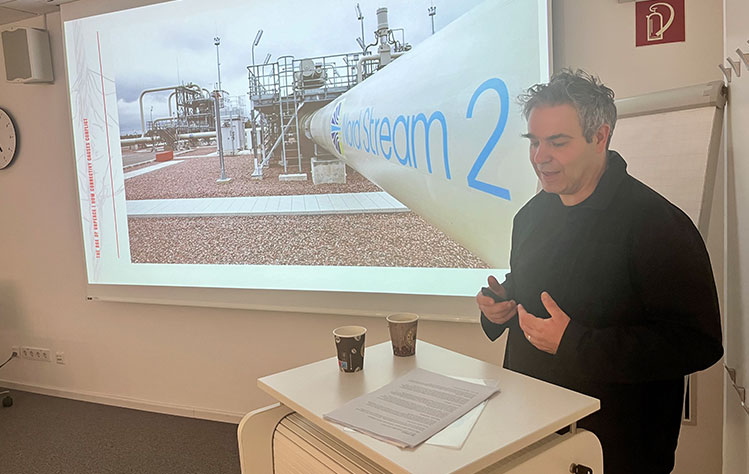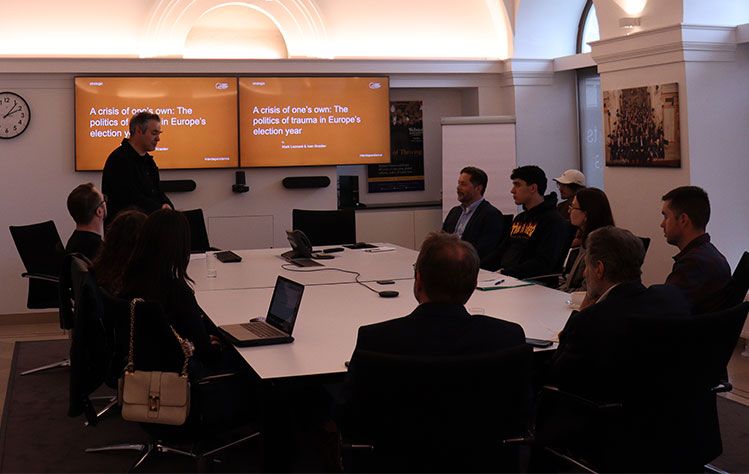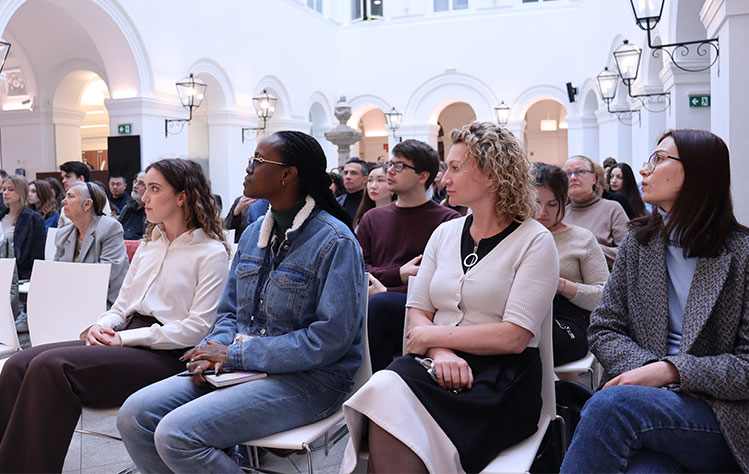Webster Vienna Hosts Chopin Visiting Professor and Geopolitics Expert Mark Leonard
May 06, 2024
 Mark Leonard presents to a large audience at the well-attended public lecture, “How
is Russia’s war on Ukraine Reshaping Europe’s Geopolitical Future?”
Mark Leonard presents to a large audience at the well-attended public lecture, “How
is Russia’s war on Ukraine Reshaping Europe’s Geopolitical Future?”
Webster Vienna Private University (WVPU) hosted Mark Leonard from April 15-18, during
which time the renowned foreign policy expert presented a series of seminars and lectures
on campus.
Leonard is co-founder and director of the European Council on Foreign Relations, the
first pan-European thinktank. He is also the current Henry A. Kissinger Chair in Foreign
Policy and International Relations in Washington, D.C.
Leonard’s areas of expertise include geopolitics and geoeconomics, China’s internal
politics, European Union politics and institutions. During his time at Webster Vienna,
the Chopin Scholar presented a guest lecture and discussion in Professor Jozef Batora’s
international security class entitled “The Age of Unpeace.” In his newest book of
the same title, Leonard expounded on connectivity’s threat to the liberal order.

Mark Leonard delivers a guest presentation as part of Professor Jozef Batora’s international
security class.
“All the things that were meant to be bringing us together are in fact driving us apart,” Leonard said in a video interview with WVPU. “Free trade is turning into sanctions and export controls; people are weaponizing migration and the Internet. And even climate change is something which people are fighting about rather than bringing people together.”
“The only way of saving the liberal world is by making people feel safe with interdependence
by making it less risky and showing how people can maintain control of their affairs
even in a world where they are connected,” he said in the interview.
Leonard also hosted a research seminar attended by faculty, students and staff on
the topic of “The Politics of Trauma in Europe’s Election Year.” In the seminar and
video interview, Leonard commented on the upcoming European parliamentary elections
and the public attitudes and political preferences among the population of selected
member states hit by multiple crises.

Mark Leonard begins his presentation at the research seminar.
“The war in Ukraine has driven Europeans and Americans much closer together and has
reminded many Europeans how much they depend on the United States for their security.
But American politics is very unpredictable,” Leonard told WVPU in a podcast recording.
When asked what Leonard would tell current International Relations students, he emphasized the importance of curiosity about the world and making your interests
and skills useful to others.
“Follow your curiosity. We’re in a world where more and more of our everyday lives
have become internationalized, and international relations are now part of every single
aspect of our everyday existence. People need experts who can understand these things…travel
the world, read lots of things about what’s going on, be curious,” Leonard told WVPU.
Honored as a “Young Global Leader” of the World Economic Forum, Leonard spends his
time helping governments, companies and international organizations make sense of
big geo-political trends of the 21st century. He is an expert in the practice of diplomacy
and business in a networked world. He has authored several books including “Why Europe
Will Run the 21st Century” and the previously mentioned “The Age of Unpeace: How Connectivity
Causes Conflict.” He hosts a weekly podcast called “Mark Leonard's World in 30 Minutes”
and writes a Project Syndicate column on global affairs. Additionally, he was chairman
of the World Economic Forum’s Global Agenda Council on Geoeconomics until 2016.
On April 18, the campus hosted the widely attended public lecture, “How is Russia’s
war on Ukraine Reshaping Europe’s Geopolitical Future?” The event was organized by
Webster Vienna and the Diplomatische Akademie Wien.
This signature event offered expert insights into one of the most pressing geopolitical issues of our time. On the topic of European Union (EU) growth, Leonard observed, that as a result of the war in Ukraine the EU is likely to become a geopolitical player.
“The war in Ukraine is creating an identity crisis just as much a security threat for Europe,” Leonard said, and he commented on Europe’s dependence on the United States for security.
 Attendees listen intently at the public lecture led by Mark Leonard.
Attendees listen intently at the public lecture led by Mark Leonard.
“Wars have come and gone, lots of well-meaning initiatives on defense foreign policy been created, but many of them withered away because Europeans easily return to the familiar comfort of America’s security umbrella. This has now changed and there is much more unified sense of a need to create geopolitical actorness in the EU.”
Since 2007, Webster Vienna has hosted the Dr. Elizabeth Chopin Endowed Visiting Professorship, donated by the late Reinhard Ortner. This professorship was created in honor of Chopin's long history of service to the university and the community. She served as director of the Vienna Campus from 1988-1999. The endowment allows Webster Vienna to attract world-renowned professors in the fields of business, international relations, art, media and psychology to lecture and share their professional experiences through public forums.
To learn about more events happening at Webster Vienna, follow @webster_vienna on Instagram.
